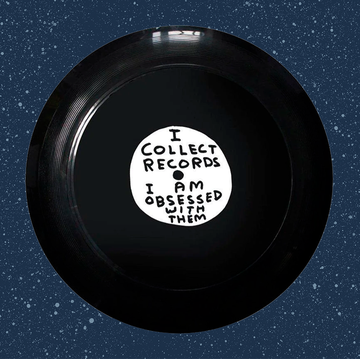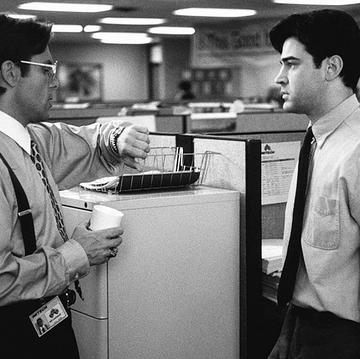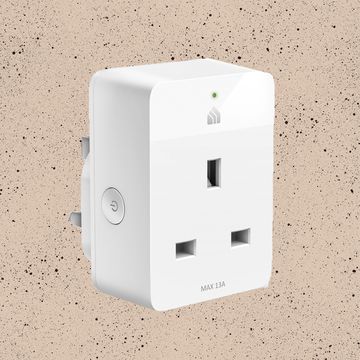Before this sentence is completed, another man in a position of power will have been caught and his routines of harassment reviled across the news, but in the meantime, let's talk about Mark Halperin.
Twelve women thus far have accused the political journalist of sexual harassment or assault during his tenure at ABC News, but three shared a similar story: They alleged that Halperin, clothed, walked up to them and mashed his penis into their bodies. Two specified that he did so in his office, in the workplace.
In response to the accusations, Halperin said, "During this period, I did pursue relationships with women that I worked with, including some junior to me. I now understand from these accounts that my behavior was inappropriate and caused others pain." (He denied pressing his genitals against anyone.)
So it seems that Halperin pursued office romances in this "inappropriate" manner at a time when he was an attractive, charismatic, wildly successful man. Had he actually asked these women out, instead of smooshing his boner into them, allegedly, they might have said yes.
Because yes, you can still date a coworker, even in 2017. One recent survey found that half of all Americans have dated a colleague, and it's not just the Mad Men set; according to another survey, 18 percent of millennials met their current partner through work, compared to 9 percent who met through online dating.
Surely it is complicated to court a colleague in a time when men are constantly losing their jobs for sexual misconduct. We could be entering an era of "criminalising courtship," as Geraldo Rivera put it after Matt Lauer and his alleged hydraulic harassment button were fired by NBC. Your request to a female colleague must be nuanced, delicate, and delivered in a certified letter vetted by a lawyer. Right?
Not really, says Patti Perez, a long-time employment lawyer who helped author California's harassment training regulations. She now serves as the vice president of workplace strategy for Emtrain, a company that creates sexual harassment training and compliance videos. "My answer would have been the same 20 years ago as it was six months ago as it is today. Use professionalism, maturity, and common sense," she says. If you're worried you might lack this grasp on basic decency, or if you want more guidelines to office relationships, read on.
First, assess the situation.
A couple of factors may knock out the feasibility of a successful office relationship, the most important being your female coworker's status as your subordinate (or vice versa). Perez says that because this type of relationship has the most potential for litigation, it's the one rule typically dictated by companies: Supervisors shouldn't date subordinates. The possibilities for impropriety are too great. Barring that dynamic, consider some other basic questions. How would the culture of your department change if people knew you were dating? How awkward would a breakup be? Do you just want to sleep with her, or do you really like her?
So, you really like her.
If you have a crush on your coworker and you'd like to take her on a date, don't ask her by grabbing her breast, or holding her against a wall until she kisses you, or pulling your penis out, or jerking off at your desk while having a conversation. "My practical answer is ask the girl out once. If she says no, then you're done. That's it. She said no. She's not interested," says Perez. "If she says yes, then I think it's reasonable to believe that constitutes an affirmative, honest answer, and you can pursue it from there." Got that?
Choose your words carefully.
To be more specific, ask her on what is clearly a date. "'Do you want to get coffee?' or "Would you like to have lunch?' are more subtle, and might be interpreted as collegial coffees or lunches," says Susan Strauss, EdD, who consults on sexual harassment issues with businesses around the world. "So if a man is picking up that there might be some interest, through flirting or innuendo that's met positively, he could say, 'I'd like to go to dinner with you, or a movie. Would you be interested?'" Again, the key here is to ask directly, and then respect the answer.
Okay, you're dating.
You and your colleague, sitting in a tree. Now what? You could try to hide the relationship entirely, but the intimacy and ease between you and your new partner might be quickly detected—offices are boring! Better to let your coworkers and boss know. "Make a plan together so that it's announced on your terms," Perez suggests. One thing you don't have to worry about anymore is notifying HR. Perez laughs out loud at the idea of a company requiring this, in fact. "Until around 10 years ago, you'd see these 'love contracts.' 'I Patti Perez, attest to the fact that I'm dating X consensually. I promise that I will alert HR to every fight and breakup.' It's so silly," she says. "It was compliance-blind lawyers trying to get around human nature."
"I don't hear about that at all anymore," adds Strauss. "Maybe it varies by industry or company, but I don't get asked about it by anyone when I do training anymore. It's a moot point." Though these love contracts may be a relic of the '90s, it's worth digging into your own contract or asking HR anonymously to make sure you're crossing every "t" and dotting every "i."
Don't act irresponsibly.
Beyond notifying colleagues, here are some other guidelines that will prepare you for any potential issues that arise:
Don't be cute. The first verboten behaviour that comes to Strauss' mind is "don't go into the corner and make out," which might seem obvious. But really—no PDA, no flirty banter, no teasing or poking or other schoolyard activities. Don't be distracting to others and don't waste company time, whether in person or online. "Might you have lunch together? Coffee? Certainly," Strauss says. "But the company's internet, the company's cell phones, none of that should ever be used as a personal communication mode. All communication needs to be above the board." That goes for Slack, too.
Don't do each other any favours. "There might be some concerns about preferential treatment," Perez warns. "What if you're in a meeting and your girlfriend stands up for you but not for other people? What if your boyfriend is really good friends with a VP?" You might remember a plot line on The Office when Pam-the-receptionist directed all incoming sales calls to her boyfriend Jim-the-salesman. Play out these scenarios within your own industry and figure out (together, off company time) how to avoid them.
Don't fight in front of everyone. Offices are tense enough without a messy breakup. "That is everyone's biggest fear. Are you going to be mature about it?" Perez says. "That's when management gets concerned; they worry that someone will say afterwards that it was nonconsensual." Unsexy as it is, making a decision together about how you will handle the breakup before you even come out to your coworkers as dating is the most mature and professional thing you can do.
So yes, Geraldo, you can still find a wife at work. The non-negotiable part is being respectful of your future girlfriend, your colleagues, and your career trajectory. If you are treating all of the aforementioned with maturity, you're already one of the good ones. Go forth and date.













